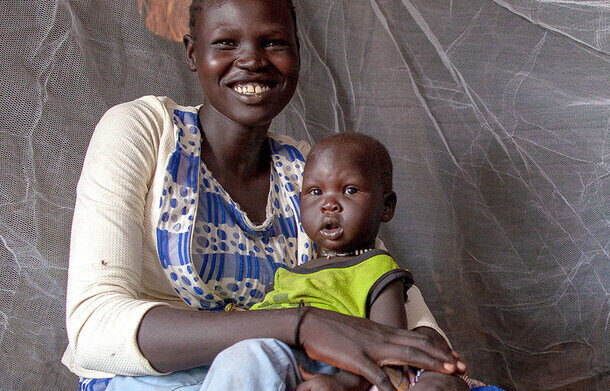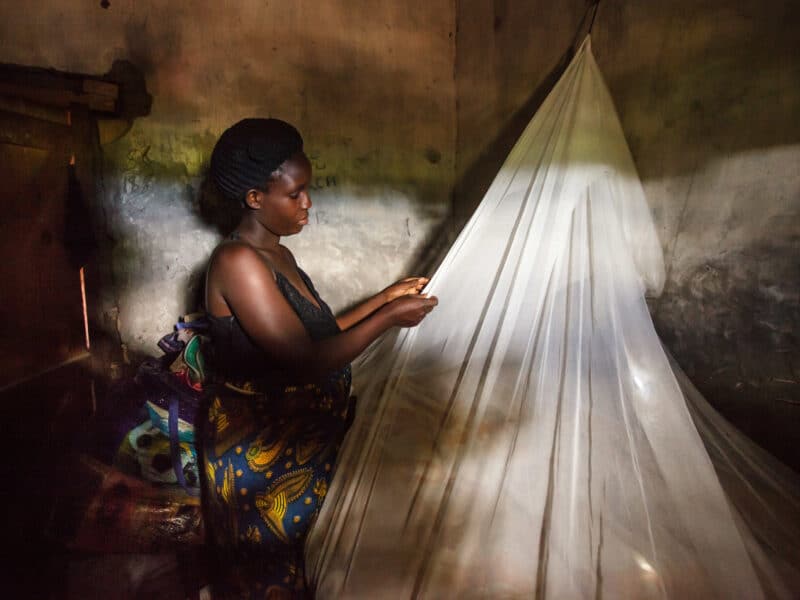Early in the COVID-19 pandemic, the World Health Organization issued a dire warning: Malaria deaths could double in Africa if access to malaria prevention programs and treatments were disrupted.
In Kenya, health officials noted that the country administered 100,000 fewer malaria tests over five weeks between mid-March and April 2020 because people with fevers feared they’d be asked to quarantine, given that fever is a common symptom of both COVID-19 and malaria.
In Uganda, a Johns Hopkins Center for Communication Programs study published in September 2021 found that 63 percent of young adults surveyed reported that their ability to access malaria services was affected by the pandemic. Community workers in many countries couldn’t meet face-to-face with their neighbors to discuss how to continue to take steps to prevent malaria in households.
“In response to the COVID-19 pandemic, malaria social and behavior change programs, including those led by CCP, have had to rethink and re-strategize to tackle new limitations in reaching people to help them understand that their behaviors are key to preventing and managing malaria,” says Gabrielle Hunter, who leads malaria efforts for CCP. “This work seems to have prevented the worst-case scenarios.”
In 2020, 85 percent of countries with planned campaigns to distribute insecticide-treated mosquito nets were able to complete or at least initiate their campaigns. At the same time, 34 countries were able to initiate or complete their indoor residual spraying campaigns. Most of this was done in new COVID-safe ways.
Still, the distraction of COVID-19 has wreaked havoc on the endemic problems that have long faced these countries as it has dominated the attention of health officials at all levels, including malaria program staff in some cases.
Despite two decades of progress, there were an estimated 229 million malaria cases worldwide in 2019 and, while malaria deaths have fallen steadily since 2000, an estimated 409,000 people died from the disease in 2019. In Africa, the number of reported COVID deaths is at least 222,000.
“In Africa this past year, malaria killed more people than COVID and predictions estimate that disruptions due to COVID could easily increase our malaria death rate,” Raj Panjabi, U.S. Global Malaria Coordinator for the U.S. President’s Malaria Initiative (PMI), recently told the RBM Partnership to End Malaria Social and Behavior Change Working Group at their 2021 Virtual Forum.
“People are scared – COVID-19 left people afraid to seek lifesaving care for malaria,” he continued. “What was once a simple message – go to a health facility immediately if you have a fever – became more nuanced, sowing confusion and mistrust and illuminating the critical importance of social and behavior change … [which] is about supporting communities and establishing a foundation of trust and respect.”
When the COVID pandemic hit, CCP and others quickly sprang into action to try to ensure that malaria wasn’t ignored.
In early 2021, CCP-led Breakthrough ACTION-Kenya developed an animated television ad depicting a happy outcome after a father seeks malaria testing and treatment for his feverish son. The spot helped normalize the new COVID-19 protection measures while reassuring community members that malaria is a big threat and also needs immediate care and treatment. Five television stations broadcasted the spot a total of 800 times between January and March 2021, and more than half of those surveyed recalled at least one of the messages.
When Nigeria imposed a country-wide lockdown at the beginning of the COVID-19 pandemic, important social and behavior change interventions for malaria prevention and treatment, like household visits and community dialogues, were suspended. To restart the activities, community-based volunteers and supervisors needed to be trained about how to continue their programs in the context of COVID-19.
Funded by PMI, CCP-led Breakthrough ACTION-Nigeria successfully used interactive voice response technology on mobile phones to reach community volunteers and local government area supervisors in 11 states with extra COVID-19 training, removing the need for in-person trainings.
Meanwhile, Breakthrough ACTION also collaborated with Facebook and PMI to launch a Facebook campaign to overcome two COVID-19 challenges: Fewer people seeking care for fever due to fears about COVID-19 and limitations on promoting malaria prevention and treatment behaviors when in-person outreach activities are restricted due to safety concerns. In just one month, the #SeekCareForFever Facebook campaign reached more than 4.7 million Facebook users, including approximately 38 percent of all Facebook users in Liberia, 39 percent in Niger and 65 percent in Sierra Leone.
Lessons learned from these and other activities were synthesized by Breakthrough ACTION and the RBM Partnership to End Malaria Social and Behavior Change Working Group on the Compass for SBC.





